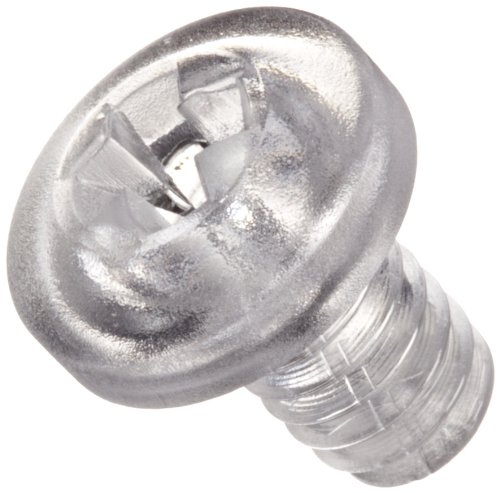Polycarbonate Machine Screw, Pan Head, Phillips Drive, #4-40, 1/4" Length (Pack of 25) Reviews
Polycarbonate Machine Screw, Pan Head, Phillips Drive, #4-40, 1/4" Length (Pack of 25) Feature
- Machine Screws are often used with nuts or driven into tapped holes
- Polycarbonate is suitable where high impact strength and hardness are primary considerations
- Pan head allows for higher tightening torques
- Phillips drive is designed to cam out under too much torque
- Coarse threads are better for brittle materials, and will assemble and disassemble more quickly than fine threads
Polycarbonate is one of the toughest, most dimensionally stable thermoplastics over a wide temperature range. Impact Strength, as measured by the Izod impact test method (which measures force required to break material), is 17 pounds per foot. This is significantly tougher than standard Nylon 6/6, which is rated at 3 pounds per foot. Polycarbonate is a relatively non-hydroscopic material; it will only absorb extremely low amounts of water even after extended exposure. Polycarbonate is very resistant to greases, oils, detergents, aliphatic hydrocarbons, most mineral acids, and the higher alcohols. It is does not perform well with chlorinated hydrocarbons, and most aromatic solvents, esters, and ketones. Polycarbonate has a blue tinted transparency with 89% light transmission. Tensile strength is approximately 10,000 psi (pounds per square inch).
Pan head fasteners have a low, large cylindrical head with a high rounded top edge for higher tightening torques - these fasteners are often recommended to replace older head styles such as round, binding, or truss-head where possible. The Phillips drive style was originally designed so that the driver would slip out under extreme torque, preventing over-tightening and damage to the fastener or the material.
A threaded fastener's size name includes information about the major external diameter, followed by the threads per inch, which indicates if it is coarse or fine. Coarse threads are better when working with brittle materials; they are sturdier and are easier to thread and unthread compared to fine. Coarse threading also allows for thicker coatings and platings.

Visit Store Now !!
Detail Products
Detail Reviews



No comments:
Post a Comment